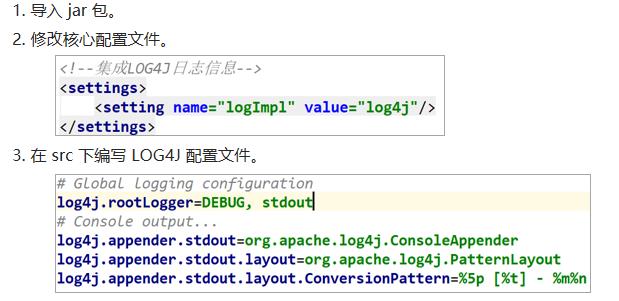MyBatis-03-笔记
Posted 寻7
tags:
篇首语:本文由小常识网(cha138.com)小编为大家整理,主要介绍了MyBatis-03-笔记相关的知识,希望对你有一定的参考价值。
MyBatis传统方式实现Dao层
MyBatis传统方式实现Dao层
1 Dao 层传统实现方式
-
分层思想:控制层(controller)、业务层(service)、持久层(dao)。
-
调用流程

-
持久层具体实现代码
- 接口StudentMapper
package com.itheima.mapper; /* 持久层接口 */ public interface StudentMapper { //查询全部 public abstract List<Student> selectAll(); //根据id查询 public abstract Student selectById(Integer id); //新增数据 public abstract Integer insert(Student stu); //修改数据 public abstract Integer update(Student stu); //删除数据 public abstract Integer delete(Integer id); } - 实现类StudentMapperImp
package com.itheima.mapper.impl; /* 持久层实现类 */ public class StudentMapperImpl implements StudentMapper { /* 查询全部 */ @Override public List<Student> selectAll() { List<Student> list = null; SqlSession sqlSession = null; InputStream is = null; try{ //1.加载核心配置文件 is = Resources.getResourceAsStream("MyBatisConfig.xml"); //2.获取SqlSession工厂对象 SqlSessionFactory sqlSessionFactory = new SqlSessionFactoryBuilder().build(is); //3.通过工厂对象获取SqlSession对象 sqlSession = sqlSessionFactory.openSession(true); //4.执行映射配置文件中的sql语句,并接收结果 list = sqlSession.selectList("StudentMapper.selectAll"); } catch (Exception e) { e.printStackTrace(); } finally { //5.释放资源 if(sqlSession != null) { sqlSession.close(); } if(is != null) { try { is.close(); } catch (IOException e) { e.printStackTrace(); } } } //6.返回结果 return list; } /* 根据id查询 */ @Override public Student selectById(Integer id) { Student stu = null; SqlSession sqlSession = null; InputStream is = null; try{ //1.加载核心配置文件 is = Resources.getResourceAsStream("MyBatisConfig.xml"); //2.获取SqlSession工厂对象 SqlSessionFactory sqlSessionFactory = new SqlSessionFactoryBuilder().build(is); //3.通过工厂对象获取SqlSession对象 sqlSession = sqlSessionFactory.openSession(true); //4.执行映射配置文件中的sql语句,并接收结果 stu = sqlSession.selectOne("StudentMapper.selectById",id); } catch (Exception e) { e.printStackTrace(); } finally { //5.释放资源 if(sqlSession != null) { sqlSession.close(); } if(is != null) { try { is.close(); } catch (IOException e) { e.printStackTrace(); } } } //6.返回结果 return stu; } /* 新增功能 */ @Override public Integer insert(Student stu) { Integer result = null; SqlSession sqlSession = null; InputStream is = null; try{ //1.加载核心配置文件 is = Resources.getResourceAsStream("MyBatisConfig.xml"); //2.获取SqlSession工厂对象 SqlSessionFactory sqlSessionFactory = new SqlSessionFactoryBuilder().build(is); //3.通过工厂对象获取SqlSession对象 sqlSession = sqlSessionFactory.openSession(true); //4.执行映射配置文件中的sql语句,并接收结果 result = sqlSession.insert("StudentMapper.insert",stu); } catch (Exception e) { e.printStackTrace(); } finally { //5.释放资源 if(sqlSession != null) { sqlSession.close(); } if(is != null) { try { is.close(); } catch (IOException e) { e.printStackTrace(); } } } //6.返回结果 return result; } /* 修改功能 */ @Override public Integer update(Student stu) { Integer result = null; SqlSession sqlSession = null; InputStream is = null; try{ //1.加载核心配置文件 is = Resources.getResourceAsStream("MyBatisConfig.xml"); //2.获取SqlSession工厂对象 SqlSessionFactory sqlSessionFactory = new SqlSessionFactoryBuilder().build(is); //3.通过工厂对象获取SqlSession对象 sqlSession = sqlSessionFactory.openSession(true); //4.执行映射配置文件中的sql语句,并接收结果 result = sqlSession.update("StudentMapper.update",stu); } catch (Exception e) { e.printStackTrace(); } finally { //5.释放资源 if(sqlSession != null) { sqlSession.close(); } if(is != null) { try { is.close(); } catch (IOException e) { e.printStackTrace(); } } } //6.返回结果 return result; } /* 删除功能 */ @Override public Integer delete(Integer id) { Integer result = null; SqlSession sqlSession = null; InputStream is = null; try{ //1.加载核心配置文件 is = Resources.getResourceAsStream("MyBatisConfig.xml"); //2.获取SqlSession工厂对象 SqlSessionFactory sqlSessionFactory = new SqlSessionFactoryBuilder().build(is); //3.通过工厂对象获取SqlSession对象 sqlSession = sqlSessionFactory.openSession(true); //4.执行映射配置文件中的sql语句,并接收结果 result = sqlSession.delete("StudentMapper.delete",id); } catch (Exception e) { e.printStackTrace(); } finally { //5.释放资源 if(sqlSession != null) { sqlSession.close(); } if(is != null) { try { is.close(); } catch (IOException e) { e.printStackTrace(); } } } //6.返回结果 return result; } }
- 接口StudentMapper
2 LOG4J的配置和使用
-
在日常开发过程中,排查问题时难免需要输出 MyBatis 真正执行的 SQL 语句、参数、结果等信息,我们就可以借助 LOG4J 的功能来实现执行信息的输出。
-
使用步骤:

- 演示
- log4j.properties
# Global logging configuration # ERROR WARN INFO DEBUG log4j.rootLogger=DEBUG, stdout # Console output... log4j.appender.stdout=org.apache.log4j.ConsoleAppender log4j.appender.stdout.layout=org.apache.log4j.PatternLayout log4j.appender.stdout.layout.ConversionPattern=%5p [%t] - %m%n - 核心配置文件MyBatisConfig.xml
<?xml version="1.0" encoding="UTF-8" ?> <!--MyBatis的DTD约束--> <!DOCTYPE configuration PUBLIC "-//mybatis.org//DTD Config 3.0//EN" "http://mybatis.org/dtd/mybatis-3-config.dtd"> <!--configuration 核心根标签--> <configuration> <!--引入数据库连接的配置文件--> <properties resource="jdbc.properties"/> <!--配置LOG4J--> <settings> <setting name="logImpl" value="log4j"/> </settings> <!--起别名--> <typeAliases> <typeAlias type="com.itheima.bean.Student" alias="student"/> <!--<package name="com.itheima.bean"/>--> </typeAliases> <!--environments配置数据库环境,环境可以有多个。default属性指定使用的是哪个--> <environments default="mysql"> <!--environment配置数据库环境 id属性唯一标识--> <environment id="mysql"> <!-- transactionManager事务管理。 type属性,采用JDBC默认的事务--> <transactionManager type="JDBC"></transactionManager> <!-- dataSource数据源信息 type属性 连接池--> <dataSource type="POOLED"> <!-- property获取数据库连接的配置信息 --> <property name="driver" value="${driver}" /> <property name="url" value="${url}" /> <property name="username" value="${username}" /> <property name="password" value="${password}" /> </dataSource> </environment> </environments> <!-- mappers引入映射配置文件 --> <mappers> <!-- mapper 引入指定的映射配置文件 resource属性指定映射配置文件的名称 --> <mapper resource="StudentMapper.xml"/> </mappers> </configuration> - 配置后当调用实现类StudentMapperImp中的方法时,在控制台能偶看到入参及结果的信息的打印。
- log4j.properties
以上是关于MyBatis-03-笔记的主要内容,如果未能解决你的问题,请参考以下文章